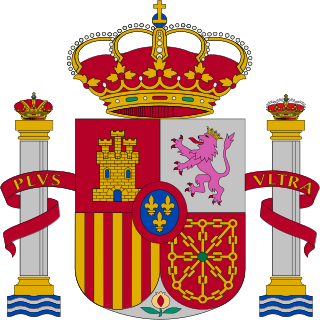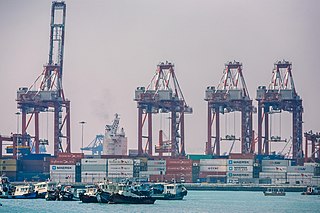
ENAIRE is the air navigation manager in Spain, certified for the provision of enroute, approach and aerodrome control services. As a public corporate entity attached to the Spanish Ministry of Public Works, it is responsible for air traffic control, aeronautical information and the communication, navigation and surveillance networks so air companies and their aircraft can fly safely and in an organised format within Spanish airspace.

The Ministry of Transport and Sustainable Mobility (MITMA), traditionally known as the Ministry of Development (MIFOM), is the department of the Government of Spain responsible for preparing and implementing the government policy on land, air and maritime transport infrastructure and the control, planning and regulation of the transport services on this areas. It is also responsible for guaranteeing access to housing; urban, soil and architecture policies; planning and controlling the postal and telegraph services, directing the services related to astronomy, geodesy, geophysics and mapping, and planning and programing the government investments on infrastructure and services related to this scope. The Ministry's headquarters are in the New Ministries government complex.

The Royal Household of Spain, officially the Household of His Majesty the King, is the constitutional body whose primary function is to provide aid and support to the King of Spain in the exercise of his royal duties and prerogatives. These include his role as head of state and as commander-in-chief of the Spanish Armed Forces. It functions as the king's executive office.

The Port of Buenos Aires is the principal maritime port in Argentina. Operated by the Administración General de Puertos, a state enterprise, it is the leading transshipment point for the foreign trade of Argentina.

The Spanish National Health System is the agglomeration of public healthcare services that has existed in Spain since it was established through and structured by the Ley General de Sanidad of 1986. Management of these services has been progressively transferred to the distinct autonomous communities of Spain, while some continue to be operated by the National Institute of Health Management, part of the Ministry of Health and Social Policy. The activity of these services is harmonized by the Interterritorial Council of the Spanish National Health Service in order to give cohesion to the system and to guarantee the rights of citizens throughout Spain.

Mirgor is an Argentinean company that produces electronics, mobile and automotive components, and exports, distributes and commercializes agricultural products. It has its administrative headquarters in the city of Buenos Aires, and industrial sites in Río Grande, Garín and Baradero, as well as its own agricultural-livestock exploitation field in Bolívar.
Renault España Sociedad Anónima, also known by its acronym RESA, is one of the largest manufacturing subsidiaries of Renault. The Spain-based company has facilities in Valladolid, Palencia and Sevilla, with most administrative offices in Madrid. Renault sells its cars locally through the subsidiary RECSA. The company emerged from the local automaker FASA, which had assembled Renault cars since 1953.

The executive branch of the government of Puerto Rico is responsible for executing the laws of Puerto Rico, as well as causing them to be executed. Article IV of the Constitution of Puerto Rico vests the executive power on the Governor—who by its nature forms the executive branch.
The Comptroller General of the State (IGAE) is a senior official of the Ministry of Finance of Spain. The comptroller directs the Office of the Comptroller General of the State Administration, which is an internal supervisory agency with the task of supervising the state public administration and of managing the public accounts.

The Port of Ceuta is a passenger and cargo port located on the North African coast, in the Strait of Gibraltar, belonging to the Spanish autonomous city of Ceuta.

The Port of Huelva is a cargo and fishing port located off the Spanish southwestern coast, belonging to the municipalities of Huelva and Palos de la Frontera. With a total annual traffic capacity of 33.8 million tonnes, it is the second biggest port in Andalusia after the Port of Algeciras.

The port of Cartagena is the port located in Cartagena, Spain. It is the fourth nationwide port in freight traffic behind Algeciras, Valencia and Barcelona. It occupies the eighth place in relation to the number of cruises. 60% of exports and the 80% of imports from the Region of Murcia are made through the port of Cartagena. More than 40% of the tourism that Cartagena receives is made by its port.

The National Parks Autonomous Agency (OAPN) is an autonomous agency of the Spanish central government that manages the National Parks Network and the Spanish Biosphere Reserves Network, as well as mountains, farms and other patrimonial assets of its property. The agency was created on June 23, 1995 by the Agriculture Minister Luis María Atienza by merging two other agencies, the Institute for the Conservation of Nature (ICONA) and the National Institute for Agrarian Reform and Development (IRYDA).
The Directorate-General for Civil Protection and Emergencies (DGPCE) is a component of the Spanish Department of the Interior responsible for promoting, planning and coordinating the various actors involved in the field of civil defence, both national and international.
The Port of Motril–Granada or simply, the port of Motril, is a passenger and cargo port in Motril, Spain. It is one of the Puertos de Interés General del Estado.

The port of Marín and Ria de Pontevedra is located in the municipalities of Marín and Pontevedra, Galicia (Spain). It is on the southern shore of the Ria de Pontevedra.

The Spanish Agricultural Guarantee Fund is an autonomous agency of the Government of Spain, attached to the Ministry of Agriculture, Fisheries and Food, whose main mission is to ensure that the funds from the European Agricultural Guarantee Fund (EAGF) and the European Agricultural Fund for Rural Development (EAFRD) of the Common Agricultural Policy (CAP) assigned to Spain are strictly applied to achieve the objectives of this policy.

The Port of Callao, officially the Callao Port Terminal, is a maritime port on the central coast of Peru, in the south-eastern Pacific, located in Callao, a suburb of Lima.















